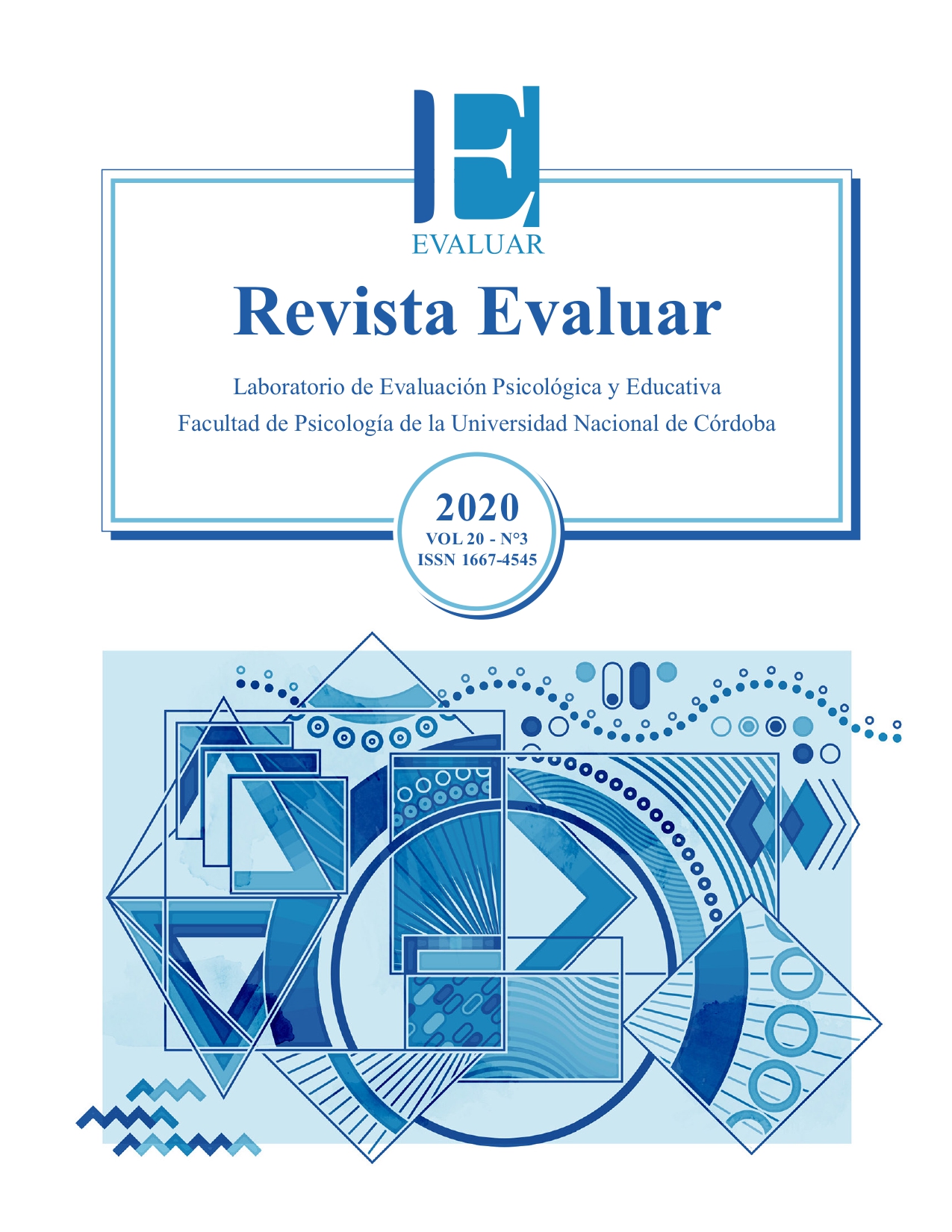Psychometric Properties of the OBCS Body Shame Scale in a Sample of Female Residents in Puerto Rico
DOI:
https://doi.org/10.35670/1667-4545.v20.n3.31706Keywords:
body shame, confirmatory factor analysis, OBCS, psychometric properties, structural equations modelingAbstract
The purpose of this study is to analyze the psychometric properties of the Spanish version of the Body Shame scale within the Objectified Body Consciousness Scale (OBCS) in a sample of women living in Puerto Rico. The sample consisted of 117 heterosexual women. A confirmatory factor analysis was conducted to evaluate the structure of the scale and internal consistency was examined. Findings revealed that the 6-item Spanish version of the Body Shame scale shows better model-data fit than the original 8-item version. The results of the study support the use of the final 6-item version of the Body Shame scale in research and practice, given that it demonstrated appropriate structure and internal consistency. In conclusion, the findings
support the use of the 6-item version of the Body Shame scale.
Downloads
References
Arbuckle, J. L. (2014). Amos (Version 23.0). [computer program]. Chicago: IBM SPSS.
Bartky, S. L. (1990). Femininity and domination: Studies in the Phenomenology of Oppression. New York, NY: Routledge. doi: 10.4324/9780203825259
Bessenoff, G. R., & Snow, D. (2006). Absorbing society’s influence: Body image self-discrepancy and internalized shame. Sex Roles, 54(9-10), 727-731. doi: 10.1037/e633872013-559
Boursier, V., Gioia, F., & Griffiths, M. D. (2020). Selfie-engagement on social media: Pathological narcissism, positive expectation, and body objectification —Which is more influential? Addictive Behaviors Reports, 11, 100263. doi: 10.1016/j.abrep.2020.100263
Calogero, R. M. (2012). Objectification theory, self-objectification, and body image. In T. Cash (Ed.), Encyclopedia of Body Image and Human Appearance (pp. 574-580). Cambridge, MA: Academic. doi: 10.1016/B978-0-12-384925-0.00091-2
Calogero, R. M., & Thompson, J. K. (2009). Potential implications of the objectification of women’s bodies for women’s sexual satisfaction. Body Image, 6(2), 145-148. doi: 10.1016/j.bodyim.2009.01.001
Claudat, K., & Warren, C. S. (2014). Self-objectification, body self-consciousness during sexual activities, and sexual satisfaction in college women. Body Image, 11(4), 509-515. doi: 10.1016/j.bodyim.2014.07.006
Dakanalis, A., Clerici, M., Caslini, M., Favagrossa, L., Prunas, A., Volpato, C., Riva, G., & Zanetti, M. A. (2014). Internalization of sociocultural standards of beauty and disordered eating behaviours: The role of body surveillance, shame and social anxiety. Journal of Psychopathology, 20(1), 33-37. Retrieved from https://www.jpsychopathol.it
DeVille, D. C., Ellmo, F. I., Horton, W. A., & Erchull, M. J. (2015). The role of romantic attachment in women’s experiences of body surveillance and body shame. Gender Issues, 32(2), 111-120. doi: 10.1007/s12147-015-9136-3
Fredrickson, B. L., & Roberts, T.-A. (1997). Objectification theory: Toward understanding women’s lived experiences and mental health risks. Psychology of Women Quarterly, 21(2), 173-206. doi: 10.1111/j.1471-6402.1997.tb00108.x
González-Rivera, J. A., & Hernández-Gato, I. (2019). Validación de una versión breve de la Escala de Satisfacción Sexual Subjetiva (ESSS-B) en Puerto Rico. Revista Evaluar, 19(2), 43-57. doi: 10.35670/1667-4545.v19.n2.25082
Grabe, S., Hyde, J. S., & Lindberg, S. M. (2007). Body objectification and depression in adolescents: The role of gender, shame, and rumination. Psychology of Women Quarterly, 31(2), 164-175. doi: 10.1111/j.1471-6402.2007.00350.x
Grower, P., Ward, L. M., & Trekels, J. (2019). Expanding models testing media contributions to self-sexualization. SAGE Open, 9(2), 1-14. doi: 10.1177/2158244019848905
IBM Corporation. (2013). SPSS Statistics for Windows (Version 22). [computer software]. Armonk, NY: IBM.
Karsay, K., Knoll, J., & Matthes, J. (2017). Sexualizing media use and self-objectification. Psychology of Women Quarterly, 42(1), 9-28. doi:
1177/0361684317743019
Manago, A. M., Ward, L. M., Lemm, K. M., Reed, L., & Seabrook, R. (2014). Facebook involvement, objectified body consciousness, body shame, and sexual assertiveness in college women and men. Sex Roles, 72(1-2), 1-14. doi: 10.1007/s11199-014-0441-1
McKinley, N. M., & Hyde, J. S. (1996). The Objectified Body Consciousness Scale: Development and validation. Psychology of Women Quarterly, 20(2), 181-215. doi: 10.1111/j.1471-6402. 1996.tb00467.x
Moradi, B. (2010). Addressing gender and cultural diversity in body image: Objectification theory as a framework for integrating theories and grounding research. Sex Roles, 63(1-2), 138-148. doi: 10.1007/s11199-010-9824-0
Moradi, B., & Huang, Y.-P. (2008). Objectification theory and psychology of women: A decade of advances and future directions. Psychology of Women Quarterly, 32(4), 377-398. doi: 10.1111/j.1471-6402.2008.00452.x
Moradi, B., & Varnes, J. R. (2017). Structure of the Objectified Body Consciousness Scale: Reevaluated 20 years later. Sex Roles, 77(5-6), 325-337. doi: 10.1007/s11199-016-0731-x
Moya-Garófano, A., Megías, J. L., Rodríguez-Bailón, R., & Moya, M. (2017). Spanish version of the Objectified Body Consciousness Scale (OBCS): Results from two samples of female university students. Revista de Psicología Social, 32(2), 362-394. doi: 10.1080/02134748.2017.1292700
Noll, S. M., & Fredrickson, B. L. (1998). A mediational model linking self-objectification, body shame, and disordered eating. Psychology of Women Quarterly, 22(4), 623-636. doi: 10.1111/j.1471-6402.1998.tb00181.x
Roberts, T.-A., Calogero, R. M., & Gervais, S. J. (2018). Objectification theory: Continuing contributions to feminist psychology. In C. B. Travis, J. W. White, A. Rutherford, W. S. Williams, S. L. Cook & K. F. Wyche (Eds.), APA handbooks in psychology®. APA handbook of the psychology of women: History, theory, and battlegrounds (pp. 249-271). Washington, DC. American Psychological Association. doi: 10.1037/0000059-013
Satorra, A., & Bentler, P. M. (1994). Correction to test statistics and standard errors in covariance structure analysis. In A. von Eye & C. C. Clogg (Eds.), Latent variables analysis: Applications for developmental research (pp. 399-419). Sage Publications.
Schaefer, L. M., Burke, N. L., Calogero, R. M., Menzel, J. E., Krawczyk, R., & Thompson, J. K. (2018). Self-objectification, body shame, and disordered eating: Testing a core mediational model of objectification theory among White, Black, and Hispanic women. Body Image, 24, 5-12 doi: 10.1016/j.bodyim.2017.10.005
Steer, A., & Tiggemann, M. (2008). The role of self-objectification in women’s sexual functioning. Journal of Social and Clinical Psychology, 27(3), 205-225. doi: 10.1521/jscp.2008.27.3.205
Szymanski, D. M., Moffitt, L. B., & Carr, E. R. (2010). Sexual objectification of women: Advances to theory and research 1ψ7. The Counseling Psychologist, 39(1), 6-38. doi: 10.1177/0011000010378402
Tiggemann, M., & Andrew, R. (2012). Clothes make a difference: The role of self-objectification. Sex Roles, 66(9-10), 646-654. doi: 10.1007/s11199-011-0085-3
Tiggemann, M., & Kuring, J. K. (2004). The role of body objectification in disordered eating and depressed mood. British Journal of Clinical Psychology, 43(3), 299-311. doi: 10.1348/0144665031752925
Veldhuis, J., Alleva, J. M., Bij de Vaate, A. J. D. (Nadia), Keijer, M., & Konijn, E. A. (2020). Me, my selfie, and I: The relations between selfie behaviors, body image, self-objectification, and self-esteem in young women. Psychology of Popular Media, 9(1), 3-13. doi: 10.1037/ppm0000206
Yilmaz, T., & Bozo, O. (2019). Turkish adaptation of the Objectified Body Consciousness Scale and the Self-Objectification Questionnaire. Dusunen Adam, 32(3), 214-226. doi: 10.14744/DAJPNS.2019.00031
Downloads
Published
How to Cite
Issue
Section
License
Copyright (c) 2020 Dariselle Jiménez-Ortiz, Israel Sánchez-Cardona, Coralee Pérez-Pedrogo

This work is licensed under a Creative Commons Attribution 4.0 International License.
Revista Evaluar aplica la Licencia Internacional de Atribuciones Comunes Creativas (Creative Commons Attribution License, CCAL). Bajo esta licencia, los autores retienen la propiedad de copyright de los artículos pero permiten que, sin que medie permiso de autor o editor, cualquier persona descargue y distribuya los artículos publicados en Evaluar. La única condición es que siempre y en todos los casos se cite a los autores y a la fuente original de publicación (i.e. Evaluar). El envío de artículos a Evaluar y la lectura de los mismos es totalmente gratuito.




_(3).jpg)



.jpg)



